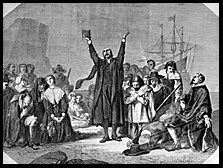The England Parliament bans public stage-plays.
The major closing was the banning of theatre at the start of the English Civil War. On September 6, 1642, by an act of Parliament, all theatres in England were closed. This meant specifically that the great playhouses and theatrical companies of London, many of which had survived since the Elizabethan age, ceased operations for good. The stated reason behind the ordinance was that attending theatre was “unseemly” during such turbulent times. The real reason, of course, was that the playhouses had become meeting places for scheming Royalists. Their Puritan rivals, who controlled Parliament, simply couldn’t have that. So theatre was banned. Within a few years most of the grand old structures, now abandoned, had decayed beyond use or were dismantled altogether–leaving no visible trace of the playhouses of Shakespeare’s day. Theatre would remain illegal until the end of the Interregnum in 1660, when the Puritans lost power and the monarchy was restored. Almost immediately, playhouses reopened and theatrical entertainments resumed. Theatre returned full force with the Restoration leading to a revival of English drama and performance that paved the way for the great age of acting and wit during the 18th century.
Coincidentally, it was also on this day that theatres reopened. On September 6, 1919, the great Equity Strike came to an end at 3 o’clock in the morning when Broadway producers finally reached an agreement with the upstart actors’ union. The strike lasted a month and closed nearly 40 major productions across the city, with revenue loses in excess of $3 million. The two sides reached a five-year deal that finally recognized Equity as the professional actors’ union. Over the next few years working conditions improved and Broadway flourished. The good times lasted only until the 1928 season when there was a noticeable dip in attendance and profits, a decline that some historians attribute to the rise of “talkies.” Of course, the next year things hit the skids big time as the stock market crash in October put Broadway in a tailspin and reset the commercial theatre’s entire economic picture for the next several decades. In many ways the professional stage never fully recovered. But Actors’ Equity remains, still setting the standard for professional theatre across the country.

